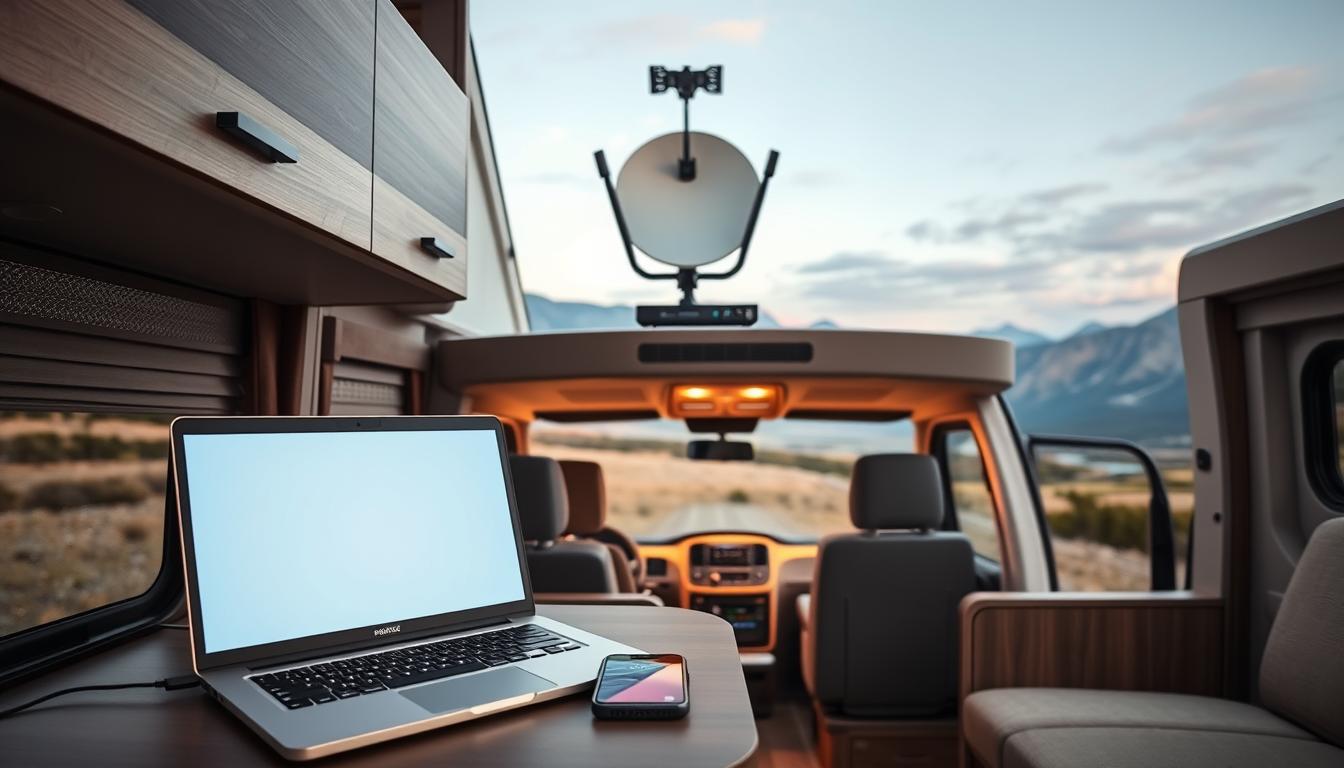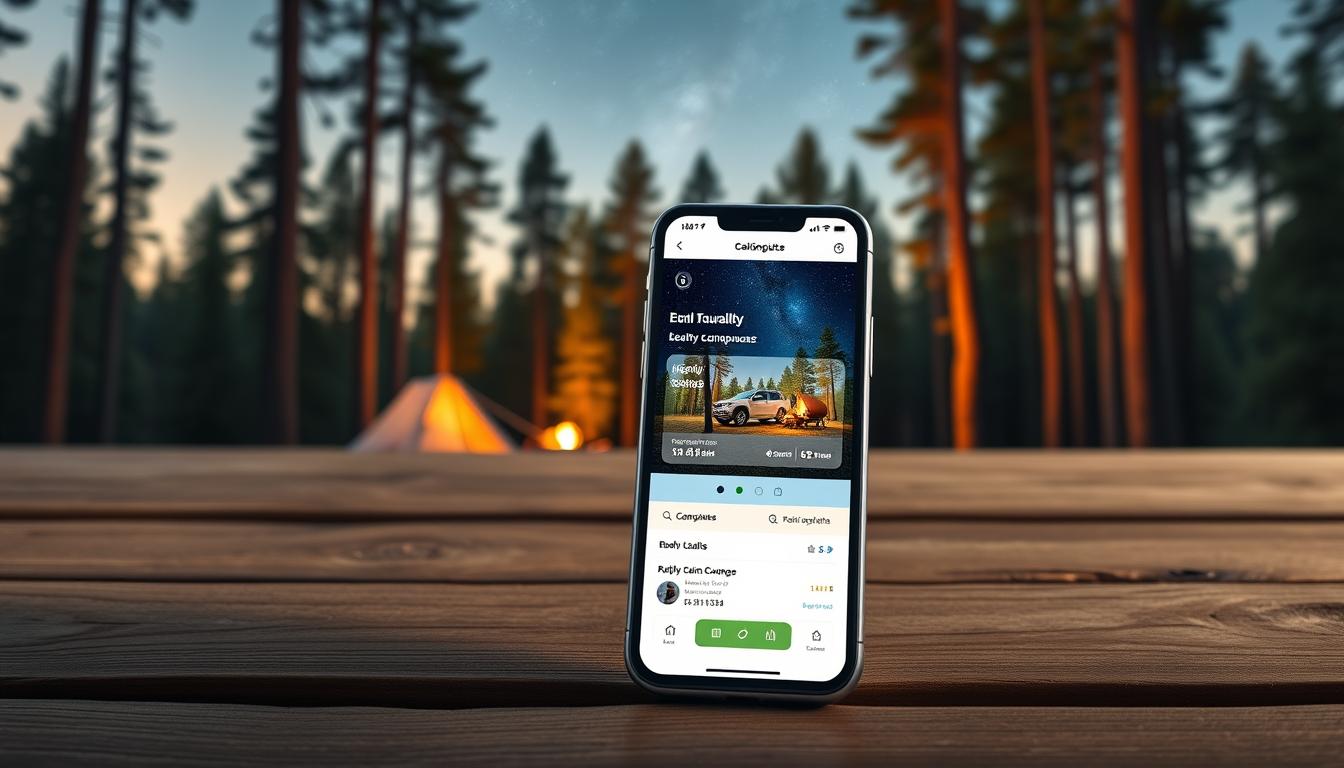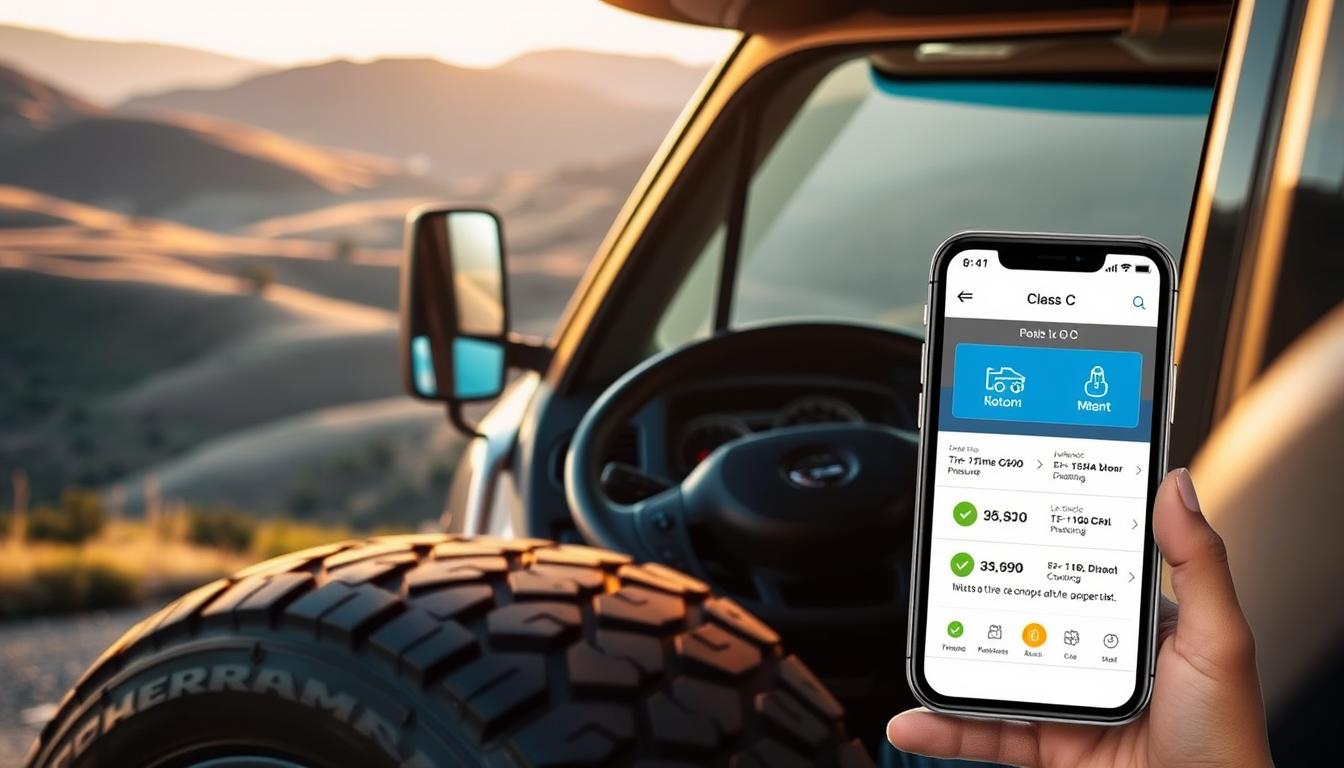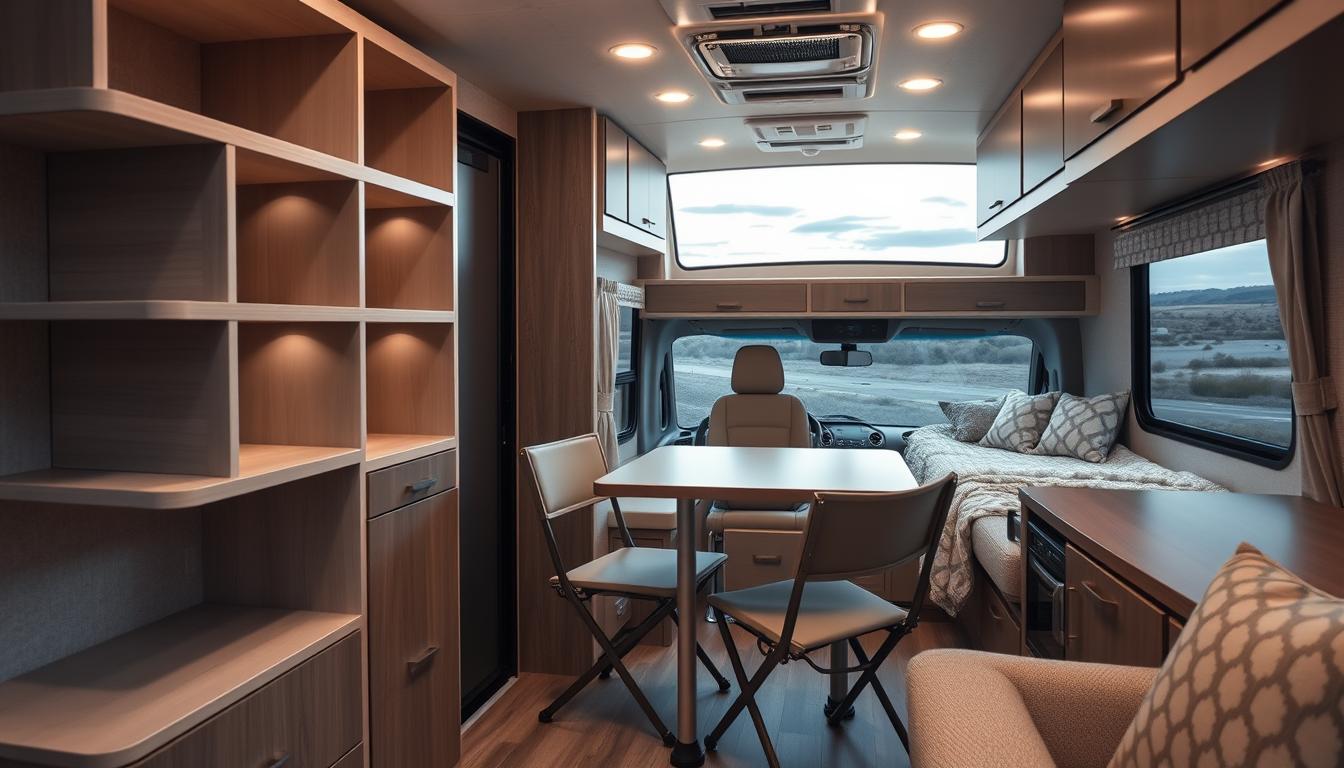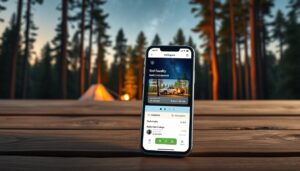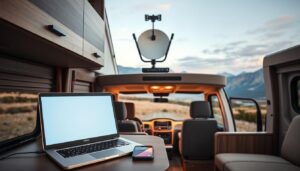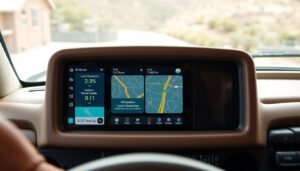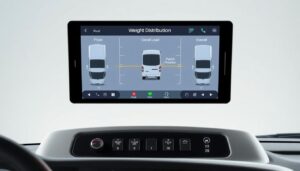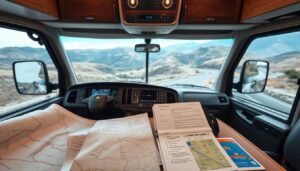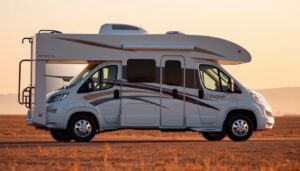Stay connected anywhere with internet setup guides for Class C motorhomes
Ever wondered how full-time travelers stay connected in their Class C motorhomes? With remote work on the rise, staying online is key. This guide covers the best ways to get internet in your RV, so you can work, communicate, and relax without interruption.
If you’re always on the move or just love the ease of RV internet, this article is for you. We’ll tackle the challenges and share smart solutions to keep you online wherever you go.
Understanding the Importance of Connectivity on the Road
Connectivity is key for RV travelers today. With remote work on the rise, many can work from anywhere. Having reliable internet is crucial for staying productive on the move.
It’s not just about work. Connectivity also boosts safety. It helps RVers navigate new places and get help when needed. This peace of mind lets families enjoy their travels more.
Sharing moments on social media keeps loved ones close. It adds to the fun of RV travel. It’s not just about where you go, but the memories you make along the way.
Challenges of Internet Access in Remote Areas
RV travelers love exploring remote spots, but they face big internet challenges. These areas often don’t have the needed infrastructure for good internet. This leads to frustrating signal problems.
The distance from cell towers is a big factor. Mountains and valleys can block signals, making it harder to stay connected.
Weather also affects internet access. Rain, snow, or strong winds can cause service interruptions. Campground Wi-Fi gets crowded during busy times, making it unreliable. Different providers in different areas can also cause dead zones without signal.
RV owners need to find ways to stay connected in remote areas. Knowing these challenges can help keep the internet going during trips.
Planning for Your Internet Setup Before Hitting the Road
Getting your internet setup right is key for RVers who want to stay online on the go. It starts with checking out cellular coverage on your route. Knowing where service might drop helps you plan better.
Look into mobile internet options at your stops. This way, you’re ready for any connectivity situation. It’s all about being prepared for different scenarios.
Think about what kind of internet you need for your trip. You might choose between cellular data or satellite internet. Don’t forget to pack the right gear, like mobile hotspots and signal boosters. These tools can make your internet connection stronger and more reliable.
Creating a checklist for your internet setup can make things easier. It helps you make sure you have everything you need for online access on the road. With the right planning and tools, staying connected in your RV can be easy and enjoyable.
Mobile Hotspot Devices for On-the-Go Internet
Mobile hotspot devices are great for getting internet on the move. They let you connect many devices at once. This way, you don’t have to rely on shaky campground Wi-Fi. There are many brands to choose from, so you can find the right one for you.
Advantages of Using a Mobile Hotspot
Mobile hotspots make traveling better in many ways. Here are some key benefits:
- Enhanced Security: Your data is safer with a hotpot than on public Wi-Fi.
- Multiple Connections: Most hotspots can handle many users and devices at the same time.
- Better Reception: They usually have stronger signals than phones, giving you a more reliable connection.
Top Mobile Hotspot Recommendations
There are many top choices for mobile hotspots:
| Device | Carrier | Connection Speed | Battery Life |
|---|---|---|---|
| Netgear Nighthawk M1 | AT&T, Verizon | Up to 1 Gbps | 24 hours |
| Verizon Jetpack MiFi 8800L | Verizon | Up to 600 Mbps | 24 hours |
| TP-Link M7350 | Unlocked | Up to 150 Mbps | 10 hours |
Getting a good mobile hotspot makes your travels easier and more fun. You’ll always have a strong internet connection.
Using Your Smartphone as a Hotspot
Turning your smartphone into a hotspot can really boost your RV internet. It lets you share your mobile data with many devices. This makes it easy to stay online while on the move.
But, there are some downsides to consider. Using your data to connect devices can quickly use up your plan. This is especially true if you’re streaming videos or downloading big files. Make sure your plan has enough data to avoid extra fees.
Also, using your phone as a hotspot can drain its battery fast. This is especially true if you’re using it for a long time. To save battery, turn on power-saving modes or plug your phone into a charger.
Choosing the right apps can make using your phone as a hotspot easier. Apps like FoxFi or NetShare for Android offer simple interfaces and useful features. They help you keep an eye on data use and adjust settings as needed.
In short, using your smartphone as a hotspot is a good way to get internet on the go. Just be smart about how you use your data and battery. This way, it can be a reliable part of your travel internet setup.
Cell Signal Boosters for Improved Connectivity
Traveling down the open road often means losing your cell signal. Cell signal boosters are great for fixing this problem, especially in remote spots. They grab weak signals, make them stronger, and send them back to your RV. This means you can stay connected and enjoy your trip without any hiccups.
How Cell Signal Boosters Work
Cell signal boosters are simple to understand. They use an outdoor antenna to catch weak signals. Then, they boost these signals and send them to an indoor antenna. This turns a weak signal into a strong one, perfect for calls and internet.
They create a stronger coverage area. This makes a big difference for RVers, making their trips better.
Recommended Cell Signal Boosters for Class C Motorhomes
Choosing the right booster is key. The HiBoost Travel 3.0 RV is a favorite among RVers. It boosts signals from all major carriers and is easy to set up. It’s perfect for those always on the move.
Other great options include the weBoost Drive 4G-X and the SureCall Fusion2Go. These devices are known for their strong signal boosts. Picking one of these can make your travels much more connected and enjoyable.
Guides for Internet Connectivity in Class C Motorhome
Keeping a steady internet connection in a Class C motorhome is key for both long-term travelers and weekend explorers. It’s all about using smart strategies that meet different needs. Guides for internet connectivity help plan for smooth access.
Mobile hotspots are a great choice for staying connected on the go. They use cell networks to give you internet, perfect for places without Wi-Fi. Picking the right mobile hotspot keeps you online as you travel.
Wi-Fi extenders are also worth considering, especially at campgrounds with Wi-Fi. They boost internet signals, making shared networks faster and more reliable. This improves your online experience.
For trips to remote spots, satellite internet is a good backup. It works where regular networks don’t. Knowing your satellite options helps pick the best service for your travels.
Signal boosters can also make a big difference. They strengthen cell signals, giving you better coverage in weak spots. Using these methods together ensures strong internet wherever you go.
Wi-Fi Extenders for Campgrounds
Wi-Fi extenders are key for better internet in campgrounds. They boost weak signals, helping RVers stay online while enjoying nature. Setting them up is easy, making internet access better in remote spots.
Setting Up a Wi-Fi Extender
To set up a Wi-Fi extender right, place it close to the Wi-Fi source. Here’s how:
- Plug in the Wi-Fi extender near the router or Wi-Fi hotspot.
- Connect to the extender’s network through your device.
- Access the extender’s setup page using a web browser.
- Follow the on-screen instructions to connect it to the existing Wi-Fi network.
- Place the extender in a location that optimizes signal coverage.
Doing this well will make internet better in your RV. All devices will get stronger signals.
Popular Wi-Fi Extender Models
Many models are known for their good performance and reliability outdoors:
| Model | Features | Range | Price |
|---|---|---|---|
| Alfa WiFi Camp Pro | Easy setup, high gain antenna | Up to 1 mile | $99 |
| Winegard ConnecT | Multiple device support, 4G LTE | Up to 2 miles | $399 |
| TP-Link RE450 | Fast Ethernet, dual-band | Up to 1,200 sq. ft. | $79.99 |
Choosing the right Wi-Fi extenders is crucial for a good camping internet experience. They make streaming, browsing, and staying in touch easy. A good device ensures you have the internet you need while traveling.
Satellite Internet Options for Remote Locations
Travelers heading to remote areas can rely on satellite internet to stay connected. This tech offers wide coverage, unlike traditional internet. Now, even in places where cell networks fail, high-speed internet is available.
Advantages of Satellite Internet
Satellite internet has many benefits:
- Extensive Coverage: It works in most places, ensuring you’re always connected.
- High-Speed Performance: New systems support streaming, gaming, and more.
- Independence from Local Infrastructure: Perfect for areas without ground-based internet, offering vital connectivity.
Popular Satellite Internet Providers
Choosing the right provider is key for a great satellite internet experience. Here are some top choices:
| Provider | Speeds (Mbps) | Data Limits | Best For |
|---|---|---|---|
| Starlink | 50-150 | Unlimited | General use |
| HughesNet | 25 | 10-50 GB | Casual browsing |
| Viasat | 12-100 | Unlimited options available | Streaming and gaming |
When picking a provider, consider speed, data limits, and what you need. This helps choose the best satellite internet for your remote adventures.
Dual-SIM and Multi-Carrier Strategies for Connectivity
Dual-SIM phones and multi-carrier strategies boost connectivity for RV travelers. Devices with dual-SIM functionality let users switch between carriers easily. This ensures a wider coverage area, crucial for reliable internet access in rural areas.
Using multi-carrier strategies, users can pick plans from AT&T, Verizon, and T-Mobile. Mixing these services creates a strong network, covering signal gaps. For example, AT&T might be better in one area, while Verizon excels in another.
To improve connectivity, follow these tips:
- Check coverage maps of different carriers in your travel areas.
- Compare plan prices and look for deals.
- Use a dual-SIM phone for personal and business lines.
- Get connectivity insurance to avoid data overages or outages.
These strategies help RV travelers stay connected and enjoy their trips more.
Using Signal Finder Apps to Enhance Reception
Signal finder apps are key in finding strong internet connections. Apps like OpenSignal and Cellmapper show the nearest cell towers. This helps improve your signal a lot.
These tools give real-time data on signal strength and quality. This information helps travelers choose the best spot for their devices. Even in remote areas, the right app can make your online experience better.
Considering Starlink for Ultimate Internet Freedom
RV travelers looking for reliable internet should check out Starlink. It uses a network of satellites in low orbit to offer fast and dependable service. This means you can stay connected, no matter where you are.
Starlink has plans for everyone, from basic to premium. Setting it up is easy, needing just a dish and a receiver. The dish finds satellites on its own. But, you should know the costs before buying.
Getting Starlink can make your travels better. You can use the internet for streaming, checking emails, and more, even when cell service is weak. It’s a great choice for long trips and staying in remote places.
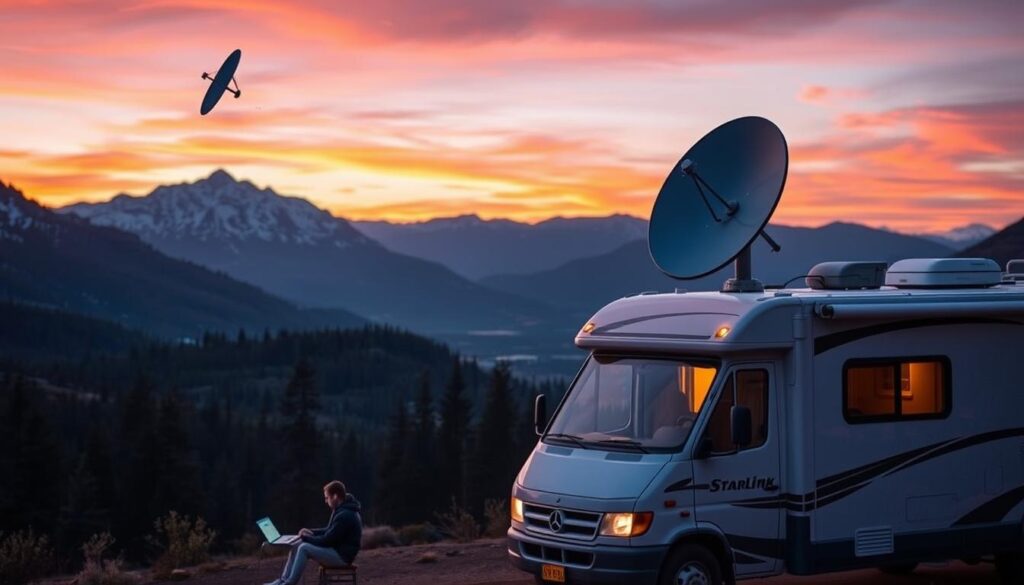
Combining Internet Solutions for Reliable Connectivity
Traveling in a Class C motorhome can be tough when it comes to staying online. Using a mix of cellular, satellite, and Wi-Fi can help keep you connected anywhere. Knowing the good and bad of each can make your internet experience better.
Cellular networks work well in cities but not so much in the countryside. Satellite internet covers more ground, perfect for off-road adventures. Wi-Fi is common at campsites, but its strength can change a lot.
Using all three services together adds a layer of security. For instance, a mobile hotspot can back up a satellite connection. This way, you’re always online, no matter where you are.
Having multiple options means you can choose the best one for your situation. This smart mix makes staying online in an RV not just possible, but fun.
Installation Considerations for Internet Gear
Setting up RV internet gear needs careful planning and the right placement. You must think about where to put routers, antennas, and boosters. Putting them higher on the roof can help get better signals.
When placing your gear, think about how close it is to devices that will use it. The best spot is one that avoids walls and furniture that might block signals. Also, hiding cables can keep your Class C motorhome looking good.
Connecting to the internet while towing is tricky. It’s important to keep your gear safe and working right. Use strong mounts and protective cases to keep everything stable and safe.
By paying attention to these details, you make your internet work better. This means a better experience online, no matter where you are.
Setting Up an Optimal Internet Environment in Your RV
To get the best internet in your RV, think about where you place your devices. Putting them in open spaces helps a lot. This means avoiding walls and furniture to get a stronger signal.
Also, having your router or hotspot in the middle of your RV is key. It lets all your devices get the best wireless signal without any blocks.
It’s also crucial to have a steady power supply for your internet gear. This keeps your connection smooth and uninterrupted. Choosing the right equipment for your needs can also boost your internet quality.
Checking your network settings and equipment often is a good habit. This keeps your internet running well, even on long trips. By following these tips, your RV will have better internet for your travels.
Practical Tips for Staying Online While Traveling
Traveling can make it hard to stay connected. Using smart tips can make a big difference. Start by using apps that save your data. This way, you can stay online without using too much of your mobile data.
Carry devices like mobile hotspots or signal boosters with you. They help you connect in places with no signal. Make sure to keep your devices in good shape. Check your connections and update your firmware to get the best performance.
Also, be mindful of your surroundings. Use apps to find nearby Wi-Fi or check signal strength. Knowing what you can expect from your network can save you from frustration. It helps you plan for other ways to stay connected.
| Tip | Description |
|---|---|
| Data Management | Utilize apps to monitor and conserve your data usage while traveling. |
| Equipment Care | Regularly maintain and update your devices for reliable performance. |
| Signal Awareness | Download apps to track local Wi-Fi availability and signal strength. |
| Offline Activities | Plan engaging offline activities to enjoy moments without internet reliance. |
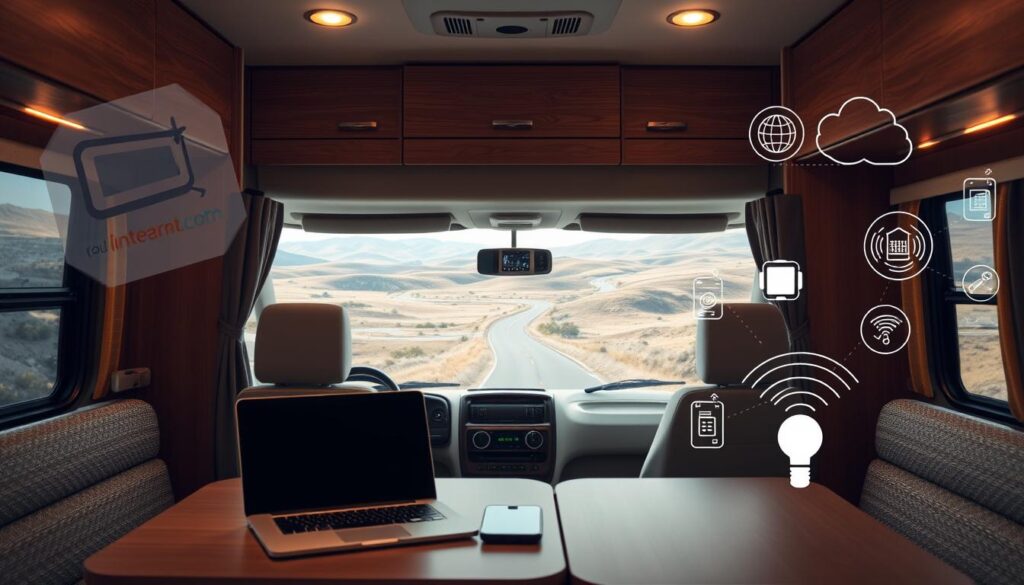
By following these tips, you can stay connected on your travels. Remember, finding the right balance between staying online and enjoying your trip is key. It makes your travel experience even better.
Conclusion
Setting up reliable internet in your Class C motorhome starts with knowing your options. You can choose from mobile hotspots, Wi-Fi extenders, or satellite internet. It’s important to think about your travel needs and where you’ll go.
Choosing the right equipment helps you stay connected on the road. This makes your travels more enjoyable and keeps you in touch with loved ones.
By using the tips from this article, RV travelers can handle connectivity issues better. This ensures you can access the internet wherever you go.
Having the right internet setup lets you enjoy your travels more. For more information, check out apps for identifying coverage areas. Travel with confidence, knowing you’re ready for any online challenge.
